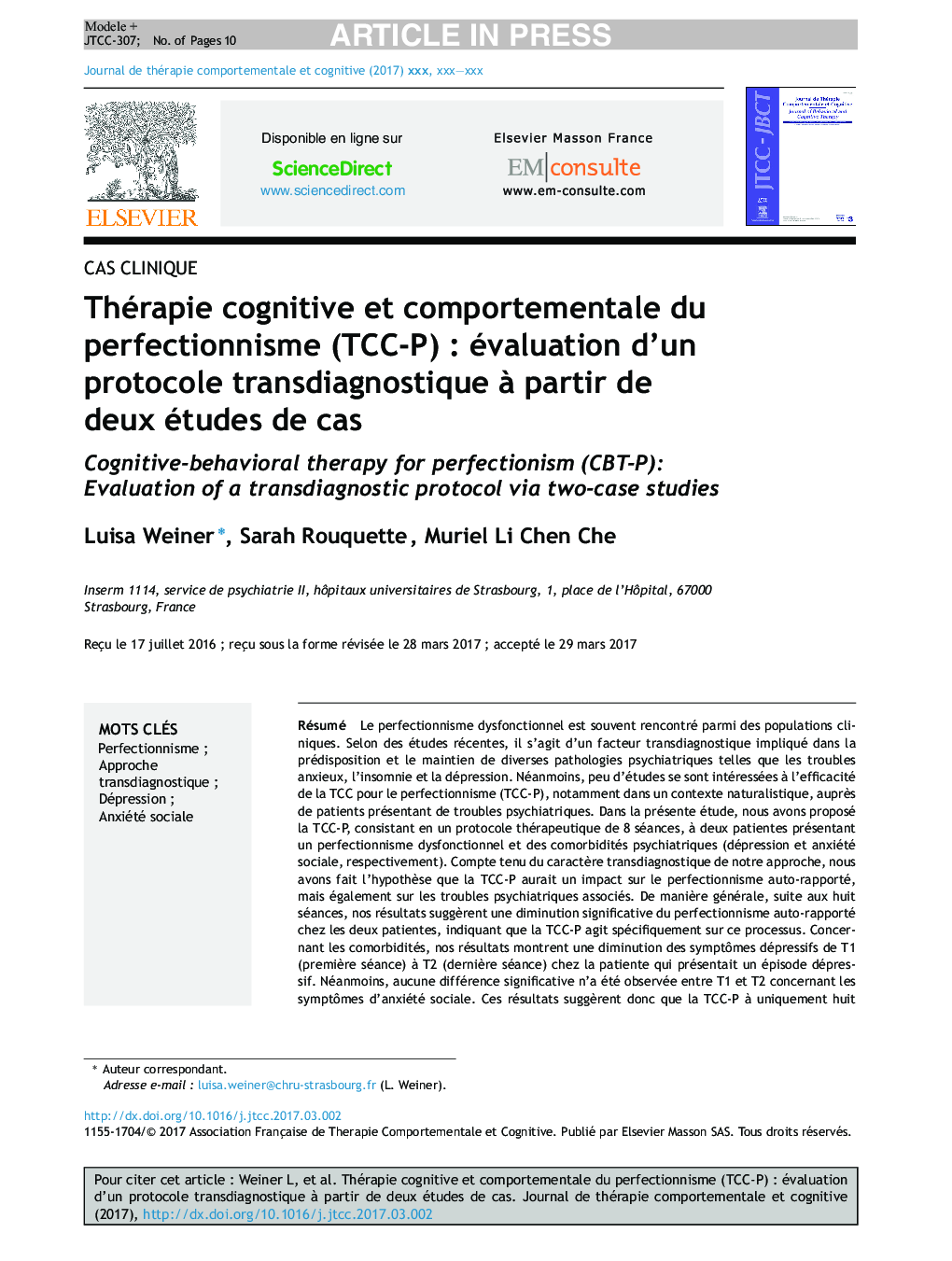| کد مقاله | کد نشریه | سال انتشار | مقاله انگلیسی | نسخه تمام متن |
|---|---|---|---|---|
| 7298212 | 1474756 | 2017 | 10 صفحه PDF | دانلود رایگان |
عنوان انگلیسی مقاله ISI
Thérapie cognitive et comportementale du perfectionnisme (TCC-P) : évaluation d'un protocole transdiagnostique à partir de deux études de cas
دانلود مقاله + سفارش ترجمه
دانلود مقاله ISI انگلیسی
رایگان برای ایرانیان
کلمات کلیدی
موضوعات مرتبط
علوم پزشکی و سلامت
پزشکی و دندانپزشکی
روانپزشکی و بهداشت روانی
پیش نمایش صفحه اول مقاله

چکیده انگلیسی
Dysfunctional perfectionism is often encountered in clinical populations. According to recent studies, perfectionism is a transdiagnostic factor involved in the onset and the maintenance of numerous psychiatric conditions, such as anxiety, insomnia, eating disorders and depression. However, few studies have investigated the efficacy of cognitive-behavioral therapy (CBT) targeting perfectionism in a naturalistic setting, in patients with psychiatric comorbidities. In this study, CBT for perfectionism, based on a treatment protocol developed by Egan et al. (2014), was offered to two patients who consulted for other psychiatric conditions (i.e., depression and social anxiety, respectively), and had elevated self-reported perfectionism. Given the transdiagnostic nature of this approach, it was hypothesized that CBT for perfectionism would have an impact on self-reported perfectionism and also on psychiatric comorbidities. The first case presented, Mrs. L., 40 years old, had a depressive episode and complained mainly of procrastination, whereas Mrs. R., aged 40, the second case presented, had social phobia, and a history of depression and insomnia. The therapy consisted in eight weekly one-hour sessions. Both patients filled out the Clinical Perfectionism Questionnaire (CPQ) at each session, and Mrs. L. only also filled out the Behavioral Activation for Depression Scale (BADS) at each session. Both patients filled out the Dysfunctional Attitudes Scale (DAS) at the first session (T1) and at the last session (T2). Because of their specific comorbidities, Mrs. L. filled out the Beck Depression Inventory (BDI-2), whereas Mrs. R. filled out the Liebowitz Social Anxiety Scale (LSAS), both at T1 and T2. The results of each questionnaire were compared between T1 and T2 with the normative data available for each questionnaire. By the end of the eight sessions, self-reported perfectionism had significantly decreased in both patients in the DAS 'Perfectionism' subscale, and in the DAS total score. In addition, results tended to decrease in the CPQ in one of the patients. BADS scores showed a slight decrease from T1 to T2, suggesting that the intervention had an effect on perfectionism per se, but did not have an impact on procrastination. In addition, depressive symptoms decreased significantly in Mrs. L., who presented, at T1, with a depressive episode. However, there was no difference in LSAS scores from T1 (first session) to T2 (last session) in Mrs. R., who presented with social phobia at T1. Qualitatively, following the eight therapy sessions, Mrs. R. reported a decrease of avoidance behaviors related to her professional tasks (i.e., finishing reports), and she felt able to identify her thinking bias in most situations associated with feeling anxious. In these situations, she has developed a more compassionate attitude towards herself. In a similar fashion, Mrs. L. reported feeling more aware of her thinking bias, and her meta-cognitive beliefs (i.e., “if I do not feel guilty, my performance will not be improved”), which were maintenance factors according to her case conceptualization. In these situations, she has also developed a more compassionate attitude towards herself. Whereas cognitive maintenance factors had evolved, her tendency to procrastinate remained significant. All in all, the results are consistent with those from a growing number of studies, which suggest that a transdiagnostic approach aiming at reducing clinical perfectionism may also have an impact on comorbidities in a clinical setting. Indeed, results on the questionnaires that assessed perfectionism specifically (CPQ and DAS) decreased significantly from T1 to T2. Moreover, depressive symptoms, assessed via the BDI-2, but not social anxiety and procrastination, also decreased significantly from T1 to T2. The absence of clinical improvement in procrastination might be due to the limited number of sessions specifically aiming this behavior - e.g., one out of eight. These results are discussed in terms of potential changes in the current protocol in order to improve the efficacy of CBT for perfectionism according to case conceptualization and psychiatric comorbidities.
ناشر
Database: Elsevier - ScienceDirect (ساینس دایرکت)
Journal: Journal de Thérapie Comportementale et Cognitive - Volume 27, Issue 4, November 2017, Pages 155-164
Journal: Journal de Thérapie Comportementale et Cognitive - Volume 27, Issue 4, November 2017, Pages 155-164
نویسندگان
Luisa Weiner, Sarah Rouquette, Muriel Li Chen Che,